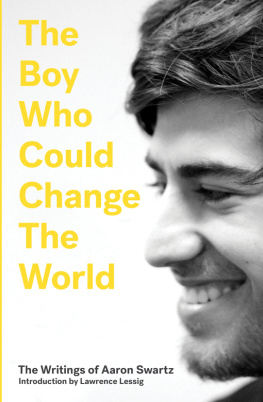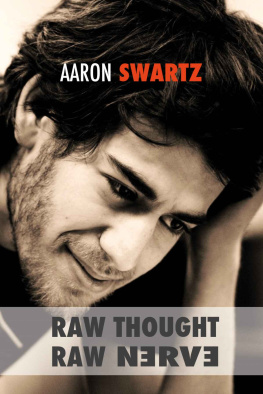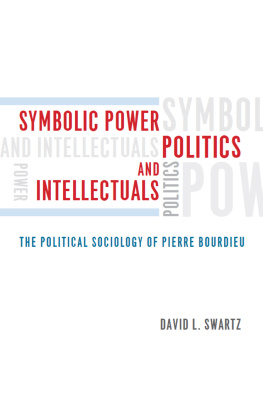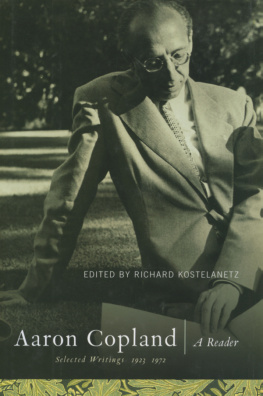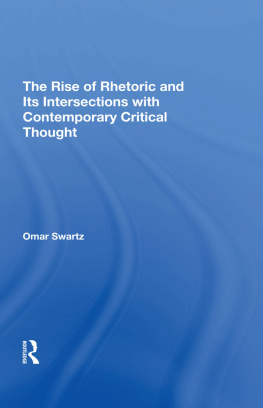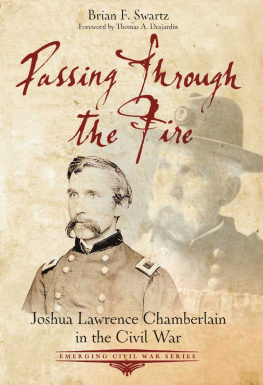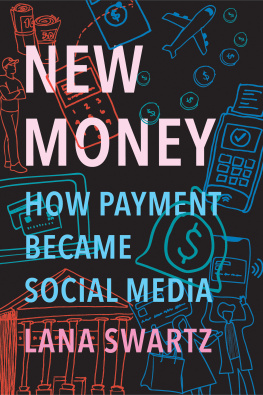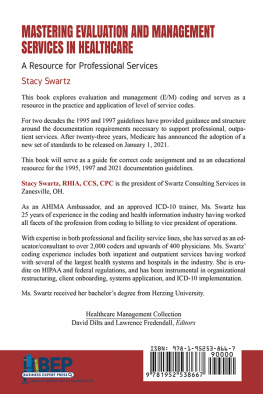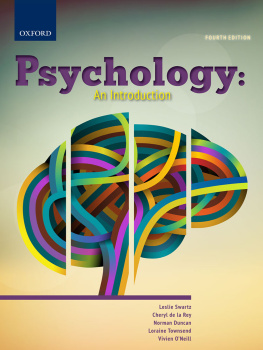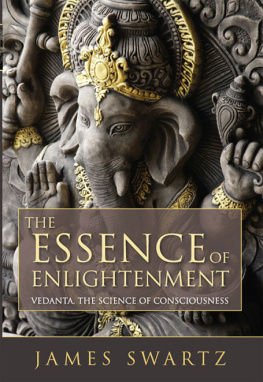Aaron Swartz - The boy who could change the world: the writings of Aaron Swartz
Here you can read online Aaron Swartz - The boy who could change the world: the writings of Aaron Swartz full text of the book (entire story) in english for free. Download pdf and epub, get meaning, cover and reviews about this ebook. City: United States, year: 2015, publisher: Verso Publications, genre: Politics. Description of the work, (preface) as well as reviews are available. Best literature library LitArk.com created for fans of good reading and offers a wide selection of genres:
Romance novel
Science fiction
Adventure
Detective
Science
History
Home and family
Prose
Art
Politics
Computer
Non-fiction
Religion
Business
Children
Humor
Choose a favorite category and find really read worthwhile books. Enjoy immersion in the world of imagination, feel the emotions of the characters or learn something new for yourself, make an fascinating discovery.
- Book:The boy who could change the world: the writings of Aaron Swartz
- Author:
- Publisher:Verso Publications
- Genre:
- Year:2015
- City:United States
- Rating:4 / 5
- Favourites:Add to favourites
- Your mark:
- 80
- 1
- 2
- 3
- 4
- 5
The boy who could change the world: the writings of Aaron Swartz: summary, description and annotation
We offer to read an annotation, description, summary or preface (depends on what the author of the book "The boy who could change the world: the writings of Aaron Swartz" wrote himself). If you haven't found the necessary information about the book — write in the comments, we will try to find it.
Aaron Swartz: author's other books
Who wrote The boy who could change the world: the writings of Aaron Swartz? Find out the surname, the name of the author of the book and a list of all author's works by series.
The boy who could change the world: the writings of Aaron Swartz — read online for free the complete book (whole text) full work
Below is the text of the book, divided by pages. System saving the place of the last page read, allows you to conveniently read the book "The boy who could change the world: the writings of Aaron Swartz" online for free, without having to search again every time where you left off. Put a bookmark, and you can go to the page where you finished reading at any time.
Font size:
Interval:
Bookmark:
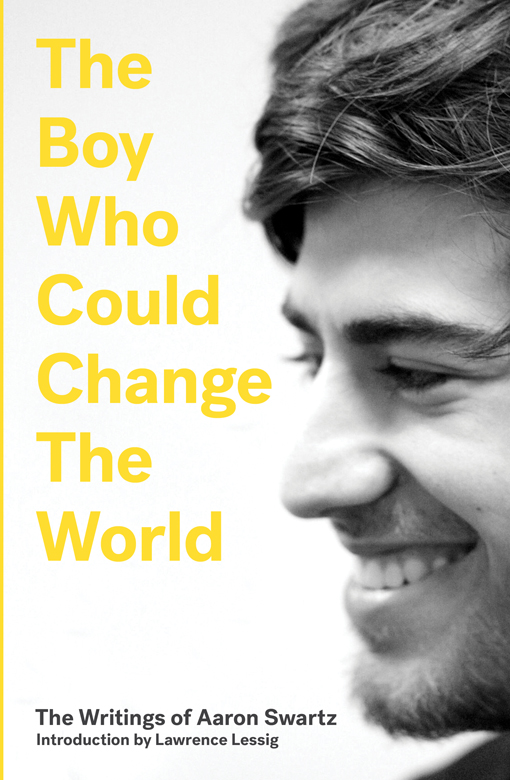

Aaron Swartz (19862013) was an American computer programmer, a writer, a political organizer, and an Internet hacktivist. He was involved in the development of RSS, Creative Commons, web.py, and Reddit. He helped launch the Progressive Change Campaign Committee in 2009 and founded the online group Demand Progress. He is survived by his parents and two brothers, who live in Chicago.
Lawrence Lessig is Roy L. Furman Professor of Law at Harvard Law School. He was the director of the Edmond J. Safra Center for Ethics at Harvard University and a founding board member of Creative Commons. He lives in Cambridge, Massachusetts.
This eBook is licensed to some random, random@mailinator.com on 03/31/2016
CHANGE THE WORLD
With an introduction by
LAWRENCE LESSIG

This eBook is licensed to some random, random@mailinator.com on 03/31/2016
First published in the UK by Verso 2016
Introduction Lawrence Lessig 2015, 2016
All other part introductions and postscripts
the individual contributors 2015, 2016
Excerpt from Aaorn Swartzs A Programmable Web: An Unfinished Work
2013 Morgan & Claypool Publishers. Used with permission.
All rights reserved
The moral rights of the author have been asserted
1 3 5 7 9 10 8 6 4 2
Verso
UK: 6 Meard Street, London W1F 0EG
US: 20 Jay Street, Suite 1010, Brooklyn, NY 11201
www.versobooks.com
Verso is the imprint of New Left Books
ISBN-13: 978-1-78478-496-6 (PB)
eISBN-13: 978-1-78478-497-3 (UK)
British Library Cataloguing in Publication Data
A catalogue record for this book is available from the British Library
Book design and composition by Bookbright Media
This book was set in Aries and Gill Sans
Printed in the UK by CPI Mackays
This eBook is licensed to some random, random@mailinator.com on 03/31/2016
This eBook is licensed to some random, random@mailinator.com on 03/31/2016
It is a fair question whether its fair to any of us to gather in one place the writings of a persons life. Writing reflects thinking. Thinking evolves. Who we were at nineteen does not reflect who we were at twenty-five, or who we would have been at fifty. Learning looks like inconsistency. Changes seem unjustified, since theyre rarely even acknowledged.
Im sure Aaron Swartz in particular would have felt this as unfairness. When he was a student at Stanford, he attended a reception at the Stanford Law School, where I was then teaching. After introducing him to some friends, I recounted to them a recent post from his blog.
Afterward, Aaron was upset with me. That was private, he said.
But you posted it on your blog, I replied, a bit puzzled by the objection.
Yes, he responded, on my blog, for the people who read my blog. Not for the random student at the Stanford Law School.
But Aaron has left us no choice. We have a right to understand the extraordinary influence that this boy had, by understanding his words and thus his thought. And one way to do that is through his words. They are incomplete. They are sometimes inconsistent, as one essay struggles against another. But as Ive read the collection gathered here, I recognize the soul who speaks through these writings. I remember these steps, and have learned more as Ive walked through them again. There is a reason for us to reflect on these bits from an incomplete life. They teach us something. And they inspire.
From a very young age, Aaron felt a freedom that most of us never really know: the freedom to simply do what you believe is right. Thats not to say that most of us live life in the wrong. But most of us have a way of avoiding the confrontations between right and wrong. We learn early on how to fudge the facts, how to dodge the uncomfortable.
Aaron never quite learned that. Or if he did, he got rid of it when he was young. It isnt as though he was that guy preaching in the corner to the unwilling listener. He wasnt. He spoke through questions, not commands. He inspired by giving others a sense of the best they could be. And he often was super-quiet as he worked out what or whom to believe. A quiet kid among strangers. A deep blue pool, hiding a volcano.
But he was not quiet in his endless writings. And these writings capture well a mind in constant reflection: often aware of his advantage, always working through the politics of a society too mixed in its own advantages, and working endlessly to understand how best to understand and persuade.
In the essays collected here, you can watch a boy working on many problems at the same time. Like the CPU in a computer, different bits are in the foreground at different times. But every theme collected here was being worked on, if differently, at every point in the adult period (from about fourteen on) of this twenty-six-year-olds life.
He was constantly working on Aaron Swartz: on who that was, and how he was constrained. He was constantly working on technology: on how to make it work, and how to make it work better for people. He was constantly working on access: to culture, and particularly access to knowledge especially; tothe stuff that was supposed to be free. He was increasingly working in political philosophy: on how to know what was right, because he certainly had his views of right. He was especially working on progressive politics: the best ways to talk about issues from surveillance to Social Security, how to rally a public. And he read voraciously, fiction as well as nonfiction, reporting at the end of each year on the hundreds of books he had read that year, with a short review of each. And tragically, he was working on what he believed he had to do, the law notwithstanding. He rallied others to cross what he believed to be an unjust line. He crossed it himself.
No one should confuse these writings with revealed truth. Aaron had learned more than many ever will. He had worked out more than most. But theres an incompleteness here, which I know he saw, but which he imagined in the years ahead he would fill out. His technical skills had tripped him into financial freedom; he loved the range to think and act that that freedom gave him, because it gave him the chance to dig deeper, over time. And if there is one thing that I think terrified him the most about the prosecution that brought about the end of his life, it was the slow recognition that even if he had won his case against the government (which his lawyers at the end believed he would), he would be left without that freedom anymore. His fortune wasted, he would have been forced back into a world where he could no longer afford to live a life devoted exclusively to what he believed was right.
In the end, a work like this can only ever be a picture of a life incomplete. Few of us will ever come close to the influence this boy had. Thats a puzzle to many. He was never on The Colbert Report or The Daily Show; NBC Nightly News never once covered the thoughts of Aaron Swartz.
Yet his influence weaved itself through the lives of an incredible number of very different souls. He found us, and, wound us up, and set us on the path that he, and maybe we, thought best. There are scores still left in his command. There is an endless amount that we must finish. For this writer, and thinker, and activist, and hacker, and dear friend, we will.
Font size:
Interval:
Bookmark:
Similar books «The boy who could change the world: the writings of Aaron Swartz»
Look at similar books to The boy who could change the world: the writings of Aaron Swartz. We have selected literature similar in name and meaning in the hope of providing readers with more options to find new, interesting, not yet read works.
Discussion, reviews of the book The boy who could change the world: the writings of Aaron Swartz and just readers' own opinions. Leave your comments, write what you think about the work, its meaning or the main characters. Specify what exactly you liked and what you didn't like, and why you think so.

